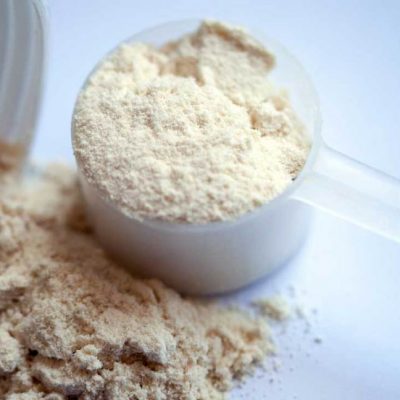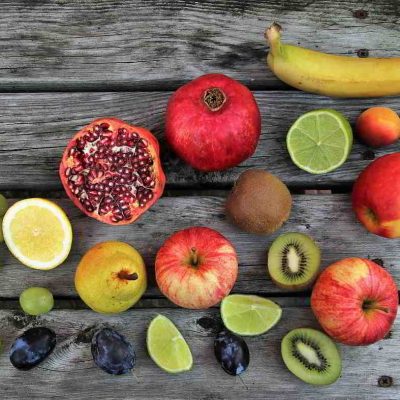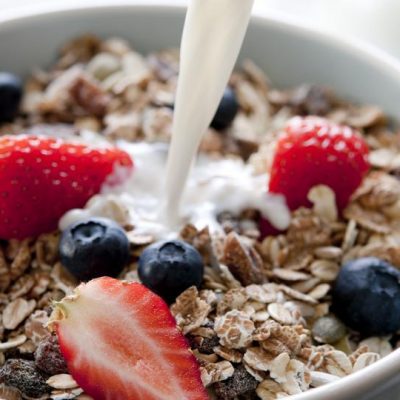Researchers at Karolinska Institutet in Sweden have identified a molecular pathway that when silenced could restore the normal function of immune cells in people with fatty liver disease. The findings could lead to new strategies for treating the condition, which is a major health risk for people with obesity. The study is published in the scientific journal Science … [Read more...]
Nutrition & Wellness News

America’s most widely Consumed Oil Causes Genetic changes in the Brain
New UC Riverside research shows soybean oil not only leads to obesity and diabetes, but could also affect neurological conditions like autism, Alzheimer's disease, anxiety, and depression. Used for fast food frying, added to packaged foods, and fed to livestock, soybean oil is by far the most widely produced and consumed edible oil in the U.S., according to the … [Read more...]
Global Diets are Converging, with Benefits and Problems
Research carried out by the University of Kent has shown that diets are changing in complex ways worldwide. International food supply patterns are supporting healthier diets in parts of the world, but causing underweight and obesity elsewhere. They are also having important effects on environmental sustainability, with potentially worrying consequences. Dr James Bentham, … [Read more...]
A replacement for exercise?
Whether it be a brisk walk around the park or high intensity training at the gym, exercise does a body good. But what if you could harness the benefits of a good workout without ever moving a muscle? Michigan Medicine researchers studying a class of naturally occurring protein called Sestrin have found that it can mimic many of exercise's effects in flies and mice. The … [Read more...]
Humans Must Adopt Vegetarian and Vegan Diets to Curb Climate Change, Says UN Report
A UN report has now warned that the world must turn towards healthy plant based diets to stop climate change. According to the report, human food system, that accounts for around 25 to 30 per cent of greenhouse gases, and is choking life from fresh and coastal waterways with excess nitrogen. According to a news published in Daily Mail, the report further states that in order to … [Read more...]
We love coffee, tea, chocolate and soft drinks so much, caffeine is literally in our blood
Scientists at Oregon State University may have proven how much people love coffee, tea, chocolate, soda and energy drinks as they validated their new method for studying how different drugs interact in the body. In conducting mass spectrometry research, Richard van Breemen and Luying Chen worked with various biomedical suppliers to purchase 18 batches of supposedly pure … [Read more...]
What and how much we eat might change our internal clocks and hormone responses
For the first time, a study shows how glucocorticoid hormones, such as cortisol, control sugar and fat levels differently during day and night, feeding and fasting, rest and activity, over the course of 24 hours. The research conducted in mice found that the time-of-day dependent metabolic cycle is altered by high caloric diet. Since glucocorticoids are widely used drugs … [Read more...]
Fitness News : Women Fitness High-Protein Diets Curb Appetite
People on low-carb, high-protein diets swear they feel more full after eating less food. Now, French researchers are helping to explain why. In a study conducted in rats, researchers found diets rich in protein cause the small intestine to produce more glucose. The liver picks up on this additional production and sends a message to the brain, where it is interpreted as a … [Read more...]
Red Bull energy drink does not improve a person’s physical performance
Energy drinks – usually a mixture of caffeine, taurine, carbohydrates, B-complex vitamins and gluconolactone – have become very popular in recent years. Although several studies support the widespread belief that energy drinks may enhance mood and/or improve cognitive and physical performance, very little research has investigated their purported ability to delay the depressant … [Read more...]
Gluten response in celiac patients could lead to diagnostic test
Distinct markers in the blood of people with celiac disease have been detected within a few hours of gluten being consumed. The findings address a longstanding mystery about what drives the adverse reaction to gluten in celiac disease and could lead to a world-first blood test for diagnosing the disease. A potential blood-based test would be a vast improvement on the … [Read more...]
Vast majority of dietary supplements don’t improve heart health or put off death, study finds
In a massive new analysis of findings from 277 clinical trials using 24 different interventions, Johns Hopkins Medicine researchers say they have found that almost all vitamin, mineral and other nutrient supplements or diets cannot be linked to longer life or protection from heart disease. Although they found that most of the supplements or diets were not associated with … [Read more...]
Fatty fish without environmental pollutants protect against type 2 diabetes
Research on the effect of fish consumption on diabetes risk has produced contradictory results in recent years. Some studies show that eating a lot of fish reduces the risk of developing type 2 diabetes, while others show it has no effect, and some studies show it even tends to increase the risk. Researchers at Chalmers University of Technology conducted a study with an … [Read more...]
Here’s why moderate drinking is probably not good for you
As a society, we love drinking. There are people who abstain, but by and large we love to drink alcohol – it’s part of our social culture, part of our collective identity, and so pervasive that it can be hard to escape from even if you try. As anyone who’s attempted a Dry July can attest, booze is something that we are all connected to in myriads of ways. So stories about … [Read more...]
Heavily processed food like ready meals and ice-cream linked to early death
People who eat large amounts of heavily processed foods, from breakfast cereals and ready meals to muffins and ice-cream, have a greater risk of heart attack, stroke and early death, according to two major studies. The findings, from separate teams in France and Spain, add to a growing body of evidence that foods made in factories with industrial ingredients may have a hand in … [Read more...]
Does sunscreen compromise vitamin D levels?
Sunscreen can reduce the sun's adverse effects, but there are concerns that it might inhibit the body's production of vitamin D. In a new British Journal of Dermatology study, however, investigators recorded an increase of vitamin D in participants during a week of cloudless weather, with very high UV index, even when sunscreens were used properly and prevented … [Read more...]
Put down the protein shake: Variety of protein better for health
Amino acids have long been touted by the fitness and bodybuilding communities for their muscle building benefits. From ultra-bulk protein powders to lean mass-promoting snack bars, there's no shortage of products available for those seeking a muscle boost. However, protein's popularity has also meant that less attention has been paid to researching its potentially negative … [Read more...]
Those home-delivered meal kits are greener than you thought
Meal kit services, which deliver a box of pre-portioned ingredients and a chef-selected recipe to your door, are hugely popular but get a bad environmental rap due to perceived packaging waste. But a new study from University of Michigan researchers found that meal kits have a much lower overall carbon footprint than the same meals purchased at a grocery store, despite … [Read more...]
Low-calorie sweetener derived from lactose gets manufacturing boost from yeast
The quest to satisfy the sweet tooth without adding to the waistline has a new weapon in its arsenal: a strain of yeast that can metabolize lactose, the sugar in dairy products, into tagatose, a natural sweetener with less than half the calories of table sugar. Yong-Su Jin, a University of Illinois professor of food science and human nutrition, led the research team that … [Read more...]
Depression, Obesity, Chronic Pain Could Be Treated By Targeting The Same Key Protein
Major depression, obesity and chronic pain are all linked to the effects of one protein, called "FK506-binding protein 51," or FKBP51. Until now, efforts to inhibit this target have been hampered by the difficulty of finding something specific enough to do the job and not affect similar proteins. Now a research group has developed a highly selective compound that can … [Read more...]
Influence of Social Media on Children’s Food Intake
New University of Liverpool research, published in Pediatrics, highlights the negative influence that social media has on children's food intake. Current research shows celebrity endorsement and television advertising of unhealthy foods increases children's intake of these foods. However, children are increasingly exposed to marketing through digital avenues, such as on … [Read more...]
Hold the fries! How calorie content makes you rethink food choices
Seeing pictures of food with calorie information not only makes food less appetizing but it also appears to change the way your brain responds to the food, according to a Dartmouth-led study published in PLOS ONE. When food images appeared with the calorie content, the brain showed decreased activation of the reward system and increased activation in the control system. In … [Read more...]
Metabolic syndrome patients need more vitamin C to break cycle of antioxidant depletion
A higher intake of vitamin C is crucial for metabolic syndrome patients trying to halt a potentially deadly cycle of antioxidant disruption and health-related problems, an Oregon State University researcher says. That's important news for the estimated 35 percent of the U.S. adult population that suffers from the syndrome. "What these findings are really saying to people … [Read more...]
Dietary fat is good? Dietary fat is bad? Coming to consensus
Which is better, a low-fat/high-carbohydrate diet or a high-fat/low-carbohydrate diet -- or is it the type of fat that matters? In a new paper featured on the cover of Science magazine's special issue on nutrition, researchers from Harvard T.H. Chan School of Public Health, Boston Children's Hospital, and colleagues with diverse expertise and perspectives on the issues laid out … [Read more...]
Eating breakfast burns more carbs during exercise and accelerates metabolism for next meal
Eating breakfast before exercise may "prime" the body to burn carbohydrates during exercise and more rapidly digest food after working out, University of Bath researchers have found. Scientists from the University's Department for Health, working with colleagues at the universities of Birmingham, Newcastle and Stirling, were studying the effect of eating breakfast versus … [Read more...]
Caffeine affects food intake at breakfast, but its effect is limited and transient
A new study featured in the Journal of the Academy of Nutrition and Dietetics found that after drinking a small amount of caffeine, participants consumed 10 percent less at a breakfast buffet provided by researchers, but this effect did not persist throughout the day and had no impact on participants' perceptions of their appetites. Based on these findings, the investigators … [Read more...]
Hunger Affects Our Feelings And Behaviours
Many people feel emotional when hungry yet little research explores the psychological mechanisms underlying such states. Guided by psychological constructionist and affect misattribution theories, hunger alone is insufficient for feeling hangry. Rather, the research team hypothesizes that people experience hunger as emotional when they conceptualize their affective state as … [Read more...]
Walnuts impact gut microbiome and improve health
Diets rich in nuts, such as walnuts, have been shown to play a role in heart health and in reducing colorectal cancer. According to a new study from the University of Illinois, the way walnuts impact the gut microbiome -- the collection of trillions of microbes or bacteria in the gastrointestinal tract -- may be behind some of those health benefits. Walnuts are … [Read more...]
Your Dietary Choices May Be Leading To The Biggest Food Waste
About a third of the food produced for human consumption is estimated to be lost or wasted globally. But the biggest waste, which is not included in this estimate, may be through dietary choices that result in the squandering of environmental resources. In a study published in the Proceedings of the National Academy of Sciences (PNAS), USA, researchers at the Weizmann Institute … [Read more...]
Can Muesli help against arthritis?
Fiber affects autoimmune diseases It is well known that healthy eating increases our general sense of wellbeing. Researchers at Friedrich-Alexander-Universität Erlangen-Nürnberg (FAU) have now discovered that a fibre-rich diet can have a positive influence on chronic inflammatory joint diseases, leading to stronger bones. The key to the effect our diet has on our … [Read more...]
Benefits of a healthy diet greater in people at high genetic risk for obesity
Genetic predisposition to obesity is no barrier to successful weight management The benefits of sticking to a healthy diet to prevent long term weight gain are greater in people at high genetic risk for obesity than in those with low genetic risk, finds a study in The BMJ today. The researchers say their findings indicate that improving diet quality over time might lead … [Read more...]
- « Previous Page
- 1
- 2
- 3
- 4
- 5
- 6
- …
- 43
- Next Page »





























